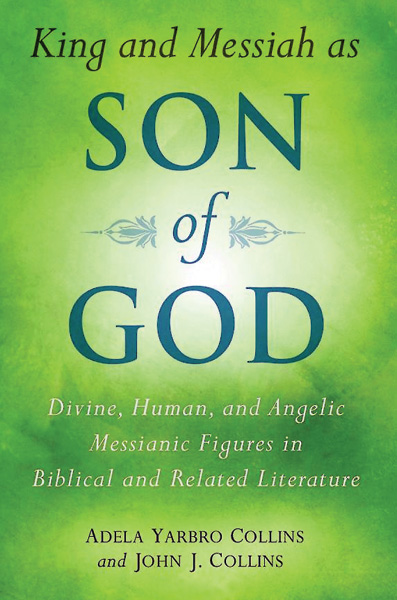
What is the origin of the idea in canonical Christian texts that Jesus existed prior to the Incarnation? And what is the source of the claim that he is a divine Messiah? These are the sorts of issues explored by Yale University scholars Adela Yarbro Collins and John Collins, a wife and husband team, each of whom wrote four of the chapters of their book. Both are prominent scholars who have spent their careers exploring eschatological topics and ancient apocalyptic texts.
The result of their exploration is that “ideas about Jesus as preexistent and divine originated in a Jewish context.” To show this they deal with the use of titles such as Son of God, Son of Man, and Messiah in the Hebrew Bible, in early Jewish literature (such as the Dead Sea Scrolls and other works such as 1 Enoch), and in the New Testament itself. They examine in detail what these texts say about the preexistence and the divinity of the messianic characters who figure in them.
Titles like “Son of God,” “Son of Man” and “Messiah” have spawned a vast library of studies over the years as experts have attempted to determine what the various ancient writers meant when they used them. The first half of the book, by John Collins, begins by examining Egyptian and Mesopotamian texts, as well as the Hebrew Bible, to determine what it meant for the king to be the son of a god. He concludes that the title points to a special relationship between god and king, though the king may not have been thought to be a god.
Isaiah 9:6 calls the future eschatological king the “Mighty God”—a title whose meaning is not explained in the text, and nothing similar appears elsewhere in Isaiah’s prophecies. The Greek translation of Psalm 110 (109 in the Greek Psalter) expresses the idea of the “rightful king’s” preexistence. The “Son of Man” in the Book of Enoch (1 Enoch 37–71) is described in language heavily influenced by “Son of Man” in Daniel 7; he is preexistent and, like God, he sits on a throne of glory and judges—traits that may suggest his divinity. In another apocalyptic book of the period, 4 Ezra, the 13th chapter speaks of a future Davidic ruler who is both heavenly and preexistent. Thus, both the Hebrew Scriptures and early Jewish literature contribute to the view that the future eschatological leader (the Messiah) is both preexistent and divine, although these texts speak of him in other ways as well.
In Paul’s letters (Philippians 2:5–11 and possibly also in 1 Corinthians 8:6 and 2 Corinthians 4:3–4), Adela Yarbro Collins finds a reference to Jesus’ preexistence. But in the Synoptic Gospels, she thinks, Jesus is not represented as preexistent.
She recognizes that the historical Jesus may have spoken about one “like a Son of Man” as a heavenly Messiah coming soon to exercise divine rule. Moreover, after the crucifixion, Jesus’ followers identified him as that Son of Man—and worshiped him, as was the case in the ruler cults of the time.
In the Gospel of John and the Book of Revelation, Jesus is called Son of God and Messiah; he is heavenly; he existed before the Incarnation. With its Logos (Word) language, the Fourth Gospel (John) depicts Jesus as a divine emanation from God, one present in the beginning. In Revelation, Jesus is an angel or is presented in angel-like terms.
Readers with a strong interest in these fascinating subjects will find much of value in these amply footnoted essays. The conclusions the authors draw are based on their wide familiarity and experience with the sources and the scholarship on them.
While they are careful in what they infer from the texts, I think they misread some of them. For example, the Dead Sea Scroll fragment identified as 4Q246 refers to a figure with the words “Son of God he shall be called, and they will name him ‘Son of the Most High.’” John Collins thinks the figure may be an interpretation of the one like a Son of Man in Daniel 7, but I think it more likely the text is referring to someone who falsely claims such titles. Adela Yarbro Collins maintains that in Revelation Jesus is an angel, but, if so, it is odd that the author never calls him an angel. The authors are always fair, however, in noting views different from their own. Their lengthy bibliography will help the eager reader pursue the topics further.

